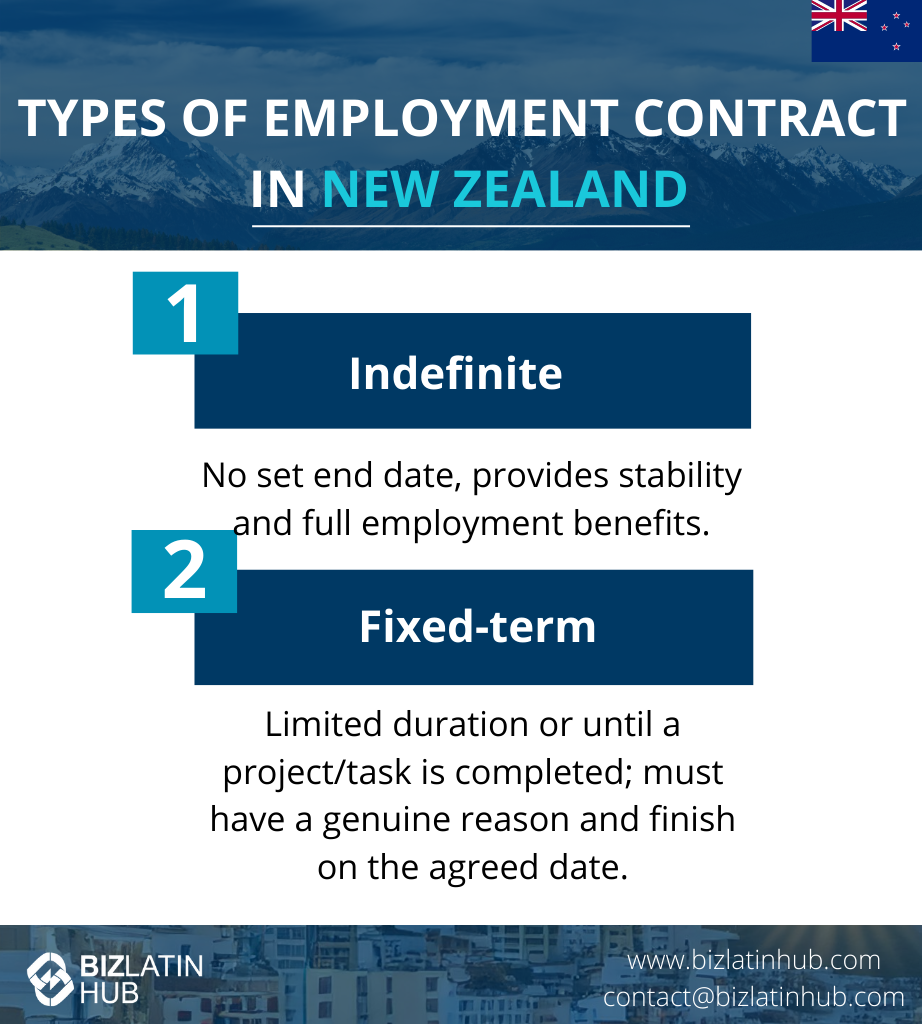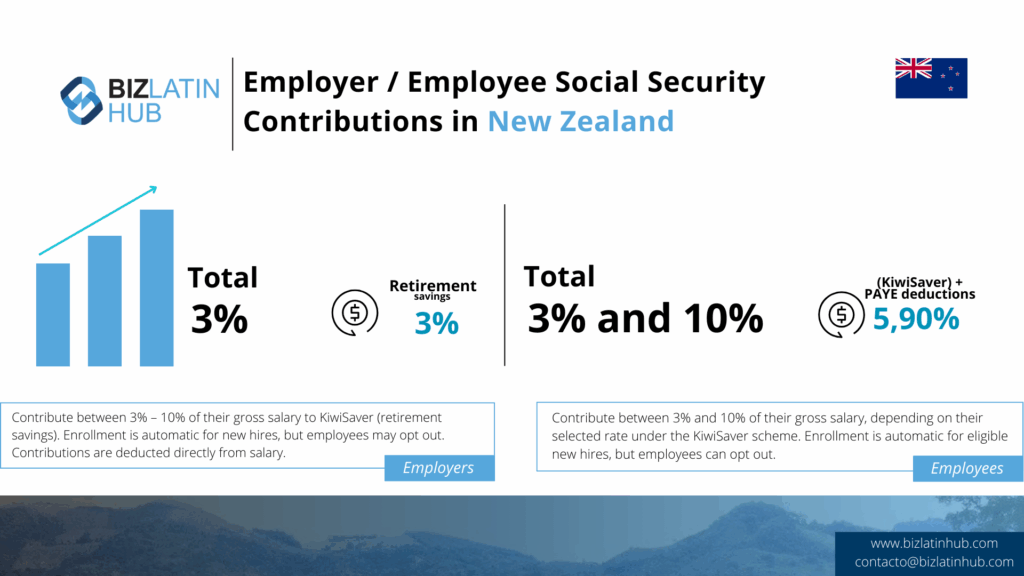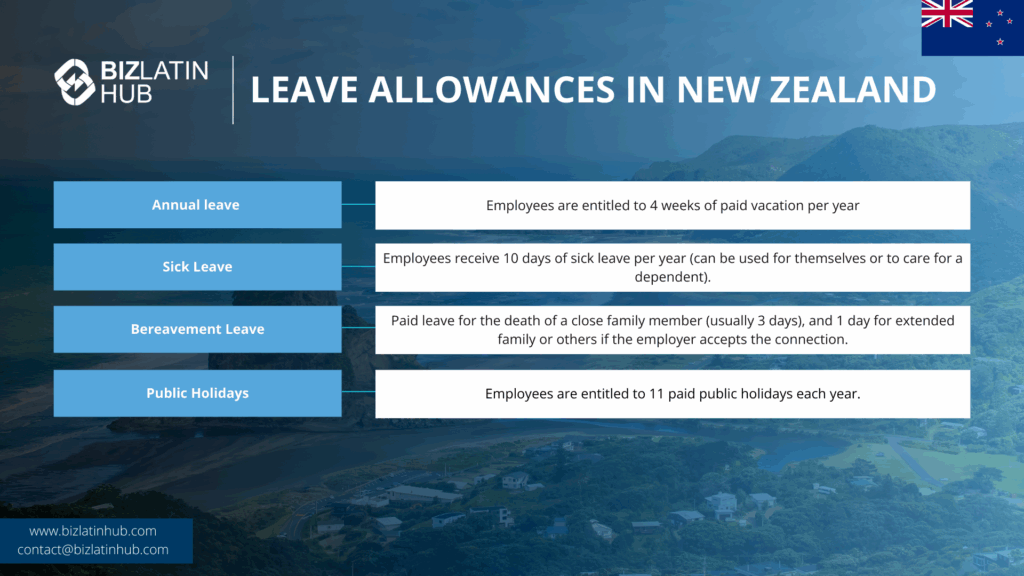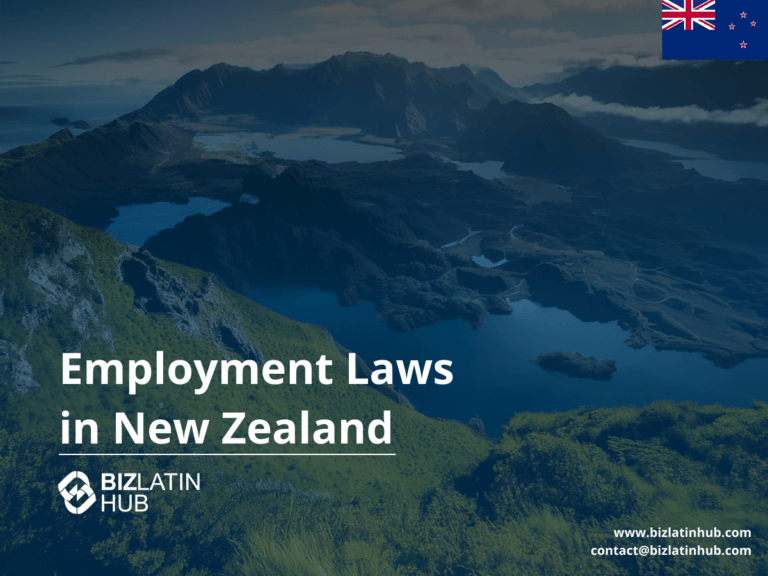As the third-freest economy in the world, New Zealand is an attractive environment for the incorporation of a company. The small country receives large sums of foreign direct investment, global trade, and has its fair share of free trade agreements. Given all these enticing characteristics of the economy, it’s no wonder so many foreign investors and entrepreneurs are looking at hiring employees in New Zealand. This guide details the essential requirements for employers under the Employment Relations Act 2000, from contracts and pay to retirement savings and dispute resolution.
Key Takeaways: New Zealand Labour Laws
| Are oral contracts legal in New Zealand? | No, a written employment agreement is mandatory for every employee. |
| What are the employer’s obligations for the KiwiSaver retirement scheme? | An equal number must be paid into the KiwiSaver scheme as an employee’s percentage of their gross salary. It can be up to 10%. |
| What leave types exist in NZ? | There are four types of leave all employees are entitled to. |
| What is a 90-day trial period and when can it be used? | The adult minimum wage in New Zealand is NZ$23.15 per hour as of January 2025. This is NZ$926 per week. |
| What is a personal grievance? | A personal grievance is a formal complaint an employee can raise against their employer if they believe they have been treated unfairly or that their employment agreement has been breached. The most common reason is unjustified dismissal. |
Key Employer Obligations in New Zealand
Before making a move into the jurisdiction, it’s important for companies to understand the labor rights and responsibilities of both employers and employees in New Zealand. What follows are a few things that foreign business owners should know about when it comes to the local work culture:
- Work hours – The standard workday in New Zealand is eight hours, with the standard workweek up to 40 hours.
- Public holidays – There are 11 public holidays in New Zealand each year.
- Vacation time – Workers in New Zealand are eligible for four weeks of vacation annually. Primary carer parents are entitled to 26 weeks’ leave.
- Contract types – There are essentially two types of contract in New Zealand, indefinite employment and fixed-term employment
1. Provide a Written Employment Agreement
Every employee must have a written employment agreement. This can be an individual agreement or a collective agreement. It must contain certain mandatory clauses.
Expert Tip: The 90-Day Trial Period Clause
From our experience, the 90-day trial period is a powerful tool for employers, but it is frequently implemented incorrectly. For the trial period to be legally valid, it must meet two strict conditions: 1) the employer must have 19 or fewer employees at the time of hiring, and 2) the trial period clause must be included in a written employment agreement that is signed by both parties before the employee begins any work.
We advise clients to finalize and sign the agreement well in advance of the start date, as an employee who starts work even one day before signing is not legally on a trial period, which removes the employer’s protection from a personal grievance claim for dismissal.
2. Comply with Minimum Pay and Leave Entitlements
Employers must pay at least the current minimum wage and provide employees with their minimum leave entitlements for annual, sick, and bereavement leave, as well as paid days off for public holidays.
3. Manage KiwiSaver and Payroll Contributions
Employers must handle payroll deductions for Pay As You Earn (PAYE) income tax and make compulsory employer contributions to the KiwiSaver retirement scheme for contributing employees.
4. Follow Procedures for Dismissal and Personal Grievances
An employer must have a legally valid reason and follow a fair process to dismiss an employee. Failure to do so can result in a personal grievance claim.
The Employment Relations Act of 2018

Politics and business in New Zealand have been trying to work together over the past three years. In terms of employment law and business, the most recent legislative change made by the team was the Employment Relations Act of 2018. Established in 2018, these new laws are now in full effect.
Aside from changes made in terms of labor union regulation, as mentioned above, the act also improves fairness and safety for employees within the workplace. Overall, the biggest changes within the act are as follows:
- Set rest and meal breaks
- Limited 90-day trial periods to businesses with 19 or fewer employees
- Reinstatement for unfairly dismissed employees
- Restoring protections and regulations for vulnerable industry employees
- Strengthens collective bargaining and union rights
The Joint Working Group
Although it was established almost 50 years ago, New Zealand’s Equal Pay Act of 1972 is receiving more attention now than ever. This comes after pay gaps between genders reached an astonishing 16% in 1998, and still lingered around 13% in 2016. As a result, the government created the Joint Working Group on Pay Equity Principles (the JWG) in 2015.
As a government organization, the JWG develops and proposes legislative ideas and recommendations. Ideally, these changes decrease the wage discrepancy between genders in New Zealand. In the near future, the government expects to make amendments to the Equal Pay Act of 1972, as well as the Employment Relations Act, to include protocol for equal pay claims. There is also talk of requiring employers to publish data surrounding pay gap statistics between male and female employees. This will make the issue at hand more transparent.
Benefits for employers who are hiring employees in New Zealand
While there are new laws to abide by, employers stand to gain from these changes too. Typically, employees in safer, friendlier working conditions tend to be happier and more engaged. As a result, employees who are happy in the workplace are 20% more productive than those who are not, so your business will ultimately benefit. For example, Norway has similar employment laws in place, and they are ranked second in the world in terms of employee happiness and satisfaction. They also have the world’s eighth highest GDP per capita.
How much it costs to hire people in New Zealand

The cost of hiring in New Zealand is less than it would be in richer nations, yet workers are often well qualified and skilled. With significant investment in education over a number of years, the New Zealand now has a surfeit of graduates in the labor market that it cannot provide local jobs for. This means that the labor market in New Zealand is relatively competitive for an incoming prospective employer.
The minimum wage in New Zealand is NZ$926 per week for an adult. However, this is not necessarily the rate that you should be offering. In top sectors that require qualified and skilled workers, you will need to offer at least market standard rate. A local hiring expert in New Zealand will be invaluable in making sure that you are not overpaying or offering unattractive rates that make it hard to recruit quality talent.
The Employment Relations Authority (ERA) is an independent government body that helps to resolve employment relationship problems. It investigates and makes decisions on disputes that employers and employees cannot solve themselves, including claims of personal grievance or unpaid wages.
Two options for hiring: establish a company or PEO
When entering the market and hiring in New Zealand, there are essentially two options available to investors and entrepreneurs. The most common way of doing so is through full company formation to establish a presence in the jurisdiction. However, this may take time and effort, meaning that it is worth considering another option as well, using a Professional Employer Organization (PEO).
PEO: fast and agile
A Professional Employer Organization (PEO), also known as a ‘Registered Employer’ or ‘Employer of Record’, is an organization that provides and supports companies with their human resources functions, from the early stages of recruitment to the payment of taxes and benefits. PEOs undertake the fundamental and time-consuming tasks of human resources teams, allowing companies to focus on the growth and success of their business.
The services of a PEO are particularly useful when businesses seek to hire a local workforce but do not wish to establish a local legal entity. Simply put, a PEO makes it easy to hire staff in New Zealand through an outsourced provider. It means you can enter the market and start hiring quickly, without having to commit to full entry until you are sure that it is what you want to do. It is worth noting that regionally there is beginning to be more regulation and PEO in New Zealand may not be viable in the future.
The long-term option: direct hiring
This is the gold standard of hiring in New Zealand, as it will give you full control over your employees as well as being sure that you will be compliant for the long term. It also gives you a higher status with potential job applicants, who will see you as a more secure long-term employer.
Before you start hiring employees in New Zealand, you will first need to get a sense of the legal, financial and cultural lay of the land. Things such as how to sort out the red tape associated with incorporation and how to manage payroll, for example. With a permanent legal presence in New Zealand, you will be fully liable for compliance with local law.
A local expert will help when hiring in New Zealand, as they will have an extensive network of qualified professionals for top jobs as well as a good idea of the local labor market. They will be able to advise on the best rates to offer and what type of profile you should be targeting. With anti-discrimination legislation important in New Zealand, especially for top jobs, they can make sure you are making a fair offer which complies with local law.
After placing adverts and receiving applications, you will want to move towards interviewing potential candidates. This should be done by both a team manager and HR representative at minimum, to make sure that everything is watertight in legal terms. You may want to include other people into the process in order to make a better assessment of the candidate.
It is entirely possible that you may wish to have a second interview, possibly involving other team members as discussed above. It is also common in the region and when hiring in New Zealand to provide candidates with an aptitude task to be completed. This usually takes the form of a dummy task that simulates the type of job that will be done in the future and confirm that they possess the skills cited on their CV.
Finally, your local advisor will be able to help you with the stages of both the hiring and onboarding process. They will make sure that you comply with standard requirements such as compulsory medical checks and make sure that any probation period is within the boundaries of those established by the labor law in New Zealand. This is generally three months.
Four key sectors in New Zealand
The agriculture sector is the bread and butter of its local and export economy, attracting a high degree of foreign investment in New Zealand. In spite of its size, the Pacific Island nation is the largest dairy exporter in the world. This is centralized by the country’s dairy-dealing kingpin, the Fonterra Co-operative Group. Additionally, the country’s red meat exports are growing fast.
Construction is responding to a population boom in New Zealand’s urban areas. People movement and immigration to New Zealand’s business and lifestyle hotspots has put a strain on housing availability. In particular, Auckland city is experiencing a housing crisis that the government is scrambling to address. Industry experts forecast that an additional 15,000 houses will need to be built per year to keep up with growth.
An up-and-comer on the list of New Zealand’s economic success stories is the nation’s fast-developing service sector. This sector makes up around 70% of the country’s GDP, with transport and logistics the largest industry. Local businesses are said to be spending, on average, around 40% more on services than wages and salaries.
New Zealand supports an immense tourism sector by touting its picturesque landscapes and diverse adventure experiences. It is the country’s largest export industry with regard to foreign exchange earnings. Tourism revenue made up 6.1% of national GDP, totaling $15.9 billion. The sector employs 8% of the New Zealand population. This record growth is largely attributed to the increasing influx of affluent Chinese tourists.
How important are unions in New Zealand?
The formation of and culture surrounding unions in New Zealand is strong. It is important to know that unions are a big part of employees’ lives and rights in the country. Recent laws have changed the regulations around unions and employers. Most notably, these changes come from The Employment Relations Act of 2018. These changes include, but are not limited to, the following:
- Earlier initiation timeframes for unions in collective bargaining
- Employers cannot deduct pay for partial strikes
- Union representatives can enter workplaces without consent in some circumstances
- The prescribed form for new employees to indicate if they intend to join a union
- Reasonable paid time for union delegates
- Employee protections against discrimination for union membership
Overall, unions in New Zealand are highly active under the current government. It is crucial for any business setting up in New Zealand to understand evolving regulations surrounding labor unions. They play a huge role in the climate and functionality of the country’s economy.

FAQs about hiring employees in New Zealand
In our experience, these are the common questions we receive from clients looking to hire in New Zealand.
Employment law in New Zealand ensures that both employers and employees have rights and responsibilities. Employers are required to treat employees fairly, provide them with at least the minimum wage mandated by the government, and fulfill other employment law obligations. Additionally, employers must ensure a safe working environment for their employees.
In New Zealand, there is no set minimum requirement for the number of hours in a standard work day. However, it is common for full-time employees to work between 7.5 to 8.0 hours per day. It is important for the number of hours worked by an employee, regardless of whether it exceeds or falls below 40 hours per week, to be specified in the employment contract.
The minimum salary in New Zealand is NZ$23.15 per hour for adults, NZ$18.16 per hour for starting-out workers, and NZ$18.16 per hour for training workers.
Overtime payment in New Zealand is not mandated by law, so employers are not required to pay employees more than their regular rate. However, some agreements may specify that employees will be paid time-and-a-half for overtime up to a certain number of hours on a specific day, and double-time for any additional overtime on that same day.
To terminate an employee in New Zealand, an employer must have a valid reason for dismissal, such as repeated misconduct, performance-related issues, or incapacity. The accepted procedure typically involves giving an oral warning, followed by a formal written warning, a final written warning, and, if necessary, dismissal. In cases of serious or gross misconduct, an employer may dismiss the employee without any notice.
KiwiSaver is a voluntary, work-based retirement savings scheme. Employers are required to automatically enroll eligible new employees and must contribute a minimum of 3% of the employee’s gross pay if the employee chooses to contribute.
All employees are entitled to four main types of leave: annual leave (four weeks per year), sick leave (ten days per year), bereavement leave, and public holidays (paid days off).
A personal grievance is a formal complaint an employee can raise against their employer if they believe they have been treated unfairly or that their employment agreement has been breached. The most common reason is unjustified dismissal.
Biz Latin Hub can help with hiring employees in New Zealand
Labor laws, foreign investments, and company formation in foreign markets can seem daunting. With the surplus of laws, regulations, exceptions to the rule, and ever-changing politics, it can be difficult to navigate the expansion and/or establishment of your business.
That’s what Biz Latin Hub is here for! With expertise in back office services and commercial representation abroad, we can help you and your company enter foreign markets all over the world. If you’re intrigued by the business opportunities waiting for you in New Zealand, contact us here with interest and/or any questions.






